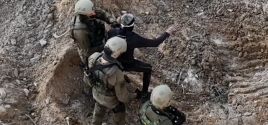Bill Aimed At Shutting Off NSA's Water Starts Moving Forward Againby Tim CushingTechdirt Nov. 21, 2014 |
Popular 
"We Were There First and Foremost for Our Country of Israel," UNC Frat Bro Tells Fox News

BlackRock CEO: 'Xenophobic' Countries With Shrinking Populations May Be The 'Big Winners' in AI-Driven Future

House Passes 'Antisemitism Awareness Act' to Silence Criticism of Israel as Hate Speech

Video Shows Israeli Soldiers 'Using Palestinian as a Human Shield'

Report: Daily Wire Got Secret Gag Order Against Candace Owens 'While Publicly Negotiating a Debate'
 The attempt to nerf the NSA's new data center in Utah continues. As we covered here at the beginning of this year, legislators and activists began pushing a bill that would cut off the NSA's water supply if it continued to gather data on American citizens. It's an interesting move, one that leverages the states' abilities to combat overreaching federal laws, but one that has gone nowhere so far. The bill was discussed and then tabled indefinitely, supposedly for "further study." Apparently, some sort of studying has gone on during the intervening months, because it appears the bill is moving forward again. On Wednesday, the Public Utilities and Technology Interim Committee discussed the bill that "prohibits cooperation between a federal agency that collects electronic data and any political subdivisions of the state."The Salt Lake Tribune has more details. Committee members expressed some concerns with the bill but no outright opposition. They asked the bill’s sponsor, Rep. Marc Roberts, R-Santaquin, to better define who would be impacted by the bill.As is par for the course in legislative discussions, the prevailing public wind was checked. Apparently, it still blows in the direction of shutting down the NSA's water supply. Rep. Barrus' stated concerns about taxpayer subsidies are admirable, if a bit on the tardy side. As it stands now, the NSA is receiving cut rates on both electricity and water -- both of which are expected to be used heavily. (The data center is projected to use four times as much electricity as the entire town of Bluffdale and over a million gallons of water a day.) If the bill does pass, the effect won't be felt immediately. Roberts’ bill would grandfather in Bluffdale’s financial agreements with the Utah Data Center, but when those agreements expire, his bill would prohibit further cooperation with the NSA. It also would prohibit any other cities or water districts from signing new agreements with the NSA.Not that grandfathering in old agreements would ultimately matter if the bill passes. Uprooting a large-scale data center doesn't happen overnight. The NSA would be back out shopping for real estate while simultaneously attempting to have the new law overturned. It buys the agency some time but doesn't eliminate a possibly waterless future. Jokes were made during the meeting that the NSA had not only read the bill but was listening in to the session, something that seems to indicate a new-found wariness of the agency's power -- something that obviously wasn't present when Bluffdale approved the data center… or any time prior to Snowden's leaks. Pete Ashdown, the founder of the Internet service provider XMission, toured the Utah Data Center before the leaks from Edward Snowden. He said an NSA administrator told him the data center came to Utah because of low energy prices and people who were patriotic.Whether or not that was the NSA rep's insinuation, there can be no question that many surveillance apologists believe the same thing: patriotism means unquestioning support of your government. This attitude completely ignores the founding of this country: the violent overthrow of the standing government and the installation of principles based on the government deriving its power from the people -- not just demanding it, along with the public's devotion. |



